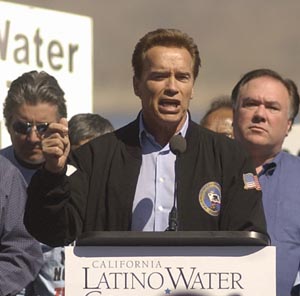
Gov. Arnold Schwarzenegger on Wednesday vetoed a bill that would
have given more overtime pay to farmworkers, saying it would
overturn long-standing rules and create
”
additional burdens on California businesses.
”
By E.J. Schultz
Gov. Arnold Schwarzenegger on Wednesday vetoed a bill that would have given more overtime pay to farmworkers, saying it would overturn long-standing rules and create “additional burdens on California businesses.”
The legislation was a top priority for Sen. Dean Florez, D-Shafter, who in a statement accused the governor of missing a chance to “wipe a 70-year-old shame off the books of California.”
“The governor had a chance to make history,” he said. “Instead, he has decided to use his pen in the spirit of the politicians of the segregationist South who pushed to discriminate against the least protected members of our society.”
California is the only state in the nation that provides overtime for farmworkers after 10 hours a day or 60 hours a week. Senate Bill 1121 would have granted overtime after eight hours.
Grower organizations lobbied hard against the bill, fearing they’d lose a competitive advantage to growers in other states that don’t require any overtime. Farmers also said the bill could mean less pay for farmworkers, because growers might cut back their hours instead of paying more.
“We were as anxious as anybody to get his decision, and we are very pleased that he decided to veto this bill,” said Ryan Jacobsen, executive director of the Fresno County Farm Bureau.
In his veto message, Schwarzenegger noted that California is the “most progressive state in the nation” by allowing overtime after 10 hours.
“This measure, while well-intended, will not improve the lives of California’s agricultural workers and instead will result in additional burdens on California businesses, increased unemployment and lower wages,” he said.
Florez had the support of United Farm Workers union leaders, whose last-minute appeal to Schwarzenegger included hand-delivering the bill to his office and kneeling and praying for his signature last week, along with Florez and a Catholic priest.
The governor “has decided not to end this vestige of a caste system of farm labor that treats California farmworkers as if they are not important workers or important human beings,” UFW President Arturo Rodriguez said in a statement.
Weeks earlier, however, UFW spokeswoman Maria Machuca told The Bee that members had mixed feelings on the issue, with some fearing reduced hours if it passed.
California in 1941 concurred with a 1938 federal law that exempted farmworkers from normal overtime rules. Farmers say the rule is needed because of factors such as weather and seasonal growing patterns that sometimes force workers to labor 60 hours one week but just 20 the next.









